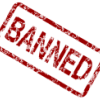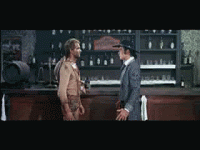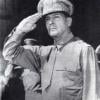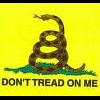-
Posts
611 -
Joined
-
Last visited
-
Donations
0.00 USD -
Points
0 [ Donate ]
Reputation Activity
-
 Pharticus reacted to Blackbart in N.j. Gun Buyback
Pharticus reacted to Blackbart in N.j. Gun Buyback
No I don't want you to trust an armed civilian...You live in Canada...You are expected to just stand there and not defend yourself or try to out run the bullets your assailant sends your way...Myself on the other hand will defend myself and those around me and terminate the threat... :)
-
 Pharticus reacted to Blackbart in N.j. Gun Buyback
Pharticus reacted to Blackbart in N.j. Gun Buyback
At the time the Constitution was drafted single shot rifles was the state of the art weapon...There were also private citizens that could afford their own cannon...You can bet your ass if the weapons we have today was available then, every able body man would own them... :)
-
 Pharticus reacted to GUNNER66 in Lonegunner
Pharticus reacted to GUNNER66 in Lonegunner
A wealthy man and his son loved to collect rare works of art. They had everything in their collection, from Picasso to Raphael. They would often sit together and admire the great works of art.
When the Vietnam conflict broke out, the son went to war. He was very courageous and died in battle while rescuing another soldier. The father was notified and grieved deeply for his only son.
About a month later, just before Christmas,
There was a knock at the door. A young man stood at the door with a large package in his hands..
He said, 'Sir, you don't know me, but I am the soldier for whom your son gave his life. He saved many lives that day, and he was carrying me to safety when a bullet struck him in the heart and he died instantly.He often talked about you, and your love for art. The young man held out this package. 'I know this isn't much. I'm not really a great artist, but I think your son would have wanted you to have this.'
The father opened the package. It was a portrait of his son, painted by the young man. He stared in awe at the way the soldier had captured the personality of his son in the painting. The father was so drawn to the eyes that his own eyes welled up with tears. He thanked the young man and offered to pay him for the picture. 'Oh, no sir, I could never repay what your son did for me. It's a gift.'
The father hung the portrait over his mantle. Every time visitors came to his home he took them to see the portrait of his son before he showed them any of the other great works he had collected. The man died a few months later. There was to be a great auction of his paintings. Many influential people gathered, excited over seeing the great paintings and having an opportunity to purchase one for their collection.
On the platform sat the painting of the son. The auctioneer pounded his gavel. We will start the bidding with this picture of the son. Who willbid for this picture? There was silence then a voice in the back of the room shouted, 'We want to see the famous paintings. Skip this one.
But the auctioneer persisted. 'Will somebody bid for this painting? Who will start the bidding? $100, $200?'Another voice angrily. 'We didn't come to see this painting. We came to see the Van Gogh's, the Rembrandts. Get on with the Real bids! But still the auctioneer continued. 'The son! The son! Who'll take the son?'
Finally, a voice came from the very back of the room. It was the longtime gardener of the man and his son. 'I'll give $10 for the painting. Being a poor man, it was all he could afford.
'We have $10, who will bid $20? Give it to him for $10. Let's see the masters.
The crowd was becoming angry. They didn't want the picture of the son.
They wanted the more worthy investments for their collections.
The auctioneer pounded the gavel.. 'Going once, twice, SOLD for $10!'
A man sitting on the second row shouted, 'Now let's get on with the collection!'
The auctioneer laid down his gavel. 'I'm sorry, the auction is over.'
What about the paintings?
'I am sorry. When I was called to conduct this auction, I was told of a secret stipulation in the will. I was not allowed to reveal that stipulation until this time. Only the painting of the son would be auctioned. Whoever bought that painting would inherit the entire estate, including the paintings.
The man who took the son gets everything!'
God gave His son over 2,000 years ago to die on the Cross. Much like the auctioneer, His message today is: 'The Son, the Son, who'll take the Son?'
Because, you see, whoever takes the Son gets everything!
FOR GOD SO LOVED THE WORLD HE GAVE HIS ONLY BEGOTTEN SON, WHO SO EVER BELIEVETH, SHALL HAVE ETERNAL LIFE.THAT'S LOVE
God Bless.
Sometimes the things we think are worthless is the real gold in life.
Merry Christmas to all!!!
-
 Pharticus got a reaction from Xtreme in N.j. Gun Buyback
Pharticus got a reaction from Xtreme in N.j. Gun Buyback
Do a need a tank? It depends on who I'm fighting. I'd like to have a bigger gun than my enemy.
-
 Pharticus got a reaction from deerejon in N.j. Gun Buyback
Pharticus got a reaction from deerejon in N.j. Gun Buyback
Do a need a tank? It depends on who I'm fighting. I'd like to have a bigger gun than my enemy.
-
 Pharticus got a reaction from Damage_inc- in N.j. Gun Buyback
Pharticus got a reaction from Damage_inc- in N.j. Gun Buyback
I just purchased my Sig Sauer M400 last night at WalMart. I had to wait 2 hours because there were 5 other guys ahead of me also purchasing AR-15s.
-
 Pharticus got a reaction from Blackbart in N.j. Gun Buyback
Pharticus got a reaction from Blackbart in N.j. Gun Buyback
Do a need a tank? It depends on who I'm fighting. I'd like to have a bigger gun than my enemy.
-
 Pharticus reacted to TheLastColdBeer in N.j. Gun Buyback
Pharticus reacted to TheLastColdBeer in N.j. Gun Buyback
The right to bear arms means just that. If a citizen wants a cache of stinger missiles, so be it. Watering down a right means ALL the rights are weakened. Right to privacy? Gone. Freedom of Speech? History. Freedom to assemble, Freedom of religion, Right to a speedy trial? Down the tubes.
http://www.archives.gov/exhibits/charters/bill_of_rights_transcript.html
Know your rights. Read the documents and understand what they mean. Our Senators & Representatives are doing a piss-poor job of upholding these rights. Our executive branch is hell-bent on undoing your rights with any means possible. Be concerned about a president who whimsically signs executive orders side-stepping Congress. This isn't a game folks, this is the future eroding before your eyes.
-
 Pharticus reacted to Blackbart in N.j. Gun Buyback
Pharticus reacted to Blackbart in N.j. Gun Buyback
Your question is moot...As long as he/she is a law abiding citizen they have the CONSTITUTIONAL RIGHT to own it... :)
-
 Pharticus reacted to bluesnut in N.j. Gun Buyback
Pharticus reacted to bluesnut in N.j. Gun Buyback
I agree with you 100%If you look back to when they stopped paddling kids in school and showing them that there is consequences for doing things wrong this is when we started having these problems . Kids now a days think its cool and edgy to go beyond the boundaries the problem with that is they haven't been taught that there is consequences for going to far. ( Before anyone starts saying it I don't want to hear it IM talking about paddling not beating the kids so leave it alone ). People need to take responsibility for there actions and not blaming guns and video games and everything else to avoid being responsible for how they raised or the lack of teaching the kids right from wrong. If you buy the gun and the child is old enough to know about them take them out and show them how to be responsible. I went to camp as a child and they took watermelons out in the field and shot them and told you this is what could happen it you weren't responsible they taught you to treat a loaded gun with the proper respect and not a toy and showed us how to fire them as well as my father was the main teacher. I never acted the wrong way with them and if you are scared of having the gun in your home buy a dam gun safe and don't play with the locks cause all of them I can remove with a swing of a hammer or 3 sec with a finger nail clippers . You spent alot of money on the guns spend the money to be safe as well.
-
 Pharticus reacted to BANNPIRE in N.j. Gun Buyback
Pharticus reacted to BANNPIRE in N.j. Gun Buyback
What a lot of you from different countries cannot seem to grasp is that our second amendment right, which is a natural right you are born with and not to ask permission to exercise by a government is as follows. The right to bear arms was not intended for hunting it was SO WE CAN PROTECT OURSELVES FROM TYRANNY. IT DOESN'T EXIST SO WE CAN CRAWL IN FETAL POSITION WHEN TYRANTS AND THEIR FOLOWERS SCARE YOU ALL INTO GIVING YOUR GUNS AWAY. IT REMINDS YOU THAT YOU HAVE THE RIGHT TO PROTECT YOURSELF , YOUR FAMILY ,AND YOUR COUNTRY FROM ENEMIES FORIGN AND DOMESTIC. NOT SO YOU CAN COWAR AT THE SIGHT OF THE GUN BECAUSE YOUR PUBLIC SCHOOLS, MEDIA AND PROPAGANDA HAD IT'S EFFECT ON YOU. SO YES, WE HAVE A NEED FOR GUNS MORE THAN EVER, NOT THE OPPOSITE. IF YOUR NOT WILLING TO FIGHT FOR YOUR FREEDOM OR NOT LET YOUR COUNTRY GET DESTROYED THEN YES YOU HAVE NO USE FOR A GUN. JUST SIT IN YOUR HOUSE AND WATCH TV LIKE A GOOD LITTLE PIECE OF CATTLE. THE ONES THAT DO NOT GIVE INTO FEAR WILL RATHER DIE ON OUR FEET THAN LIVE ON OUR KNEES IN FEAR EASILY MANIPULATED BY THE NEXT FALSE FLAG OR TREND. I PITTY THOSE PEOPLE
The answer to 1984 is 1776
-
 Pharticus reacted to NITRO in N.j. Gun Buyback
Pharticus reacted to NITRO in N.j. Gun Buyback
Banning any weapon only takes the weapon from the law abiding citizen. Criminals and wacko's dont follow the law, so still retain said weapons. What you end up with there is disarming the very people who want it as protection against the very people who are still left locked and loaded in spite of the law. In fact most of the mass shootings have been in areas where strict gun control is in effect. Proving that the restrictions haven't prevented shit... Anyway, doesn't the Constitution explicitly state that the American people as a militia, are not to be disarmed by anyone gorvenment or not, in order to be able to protect state and country against tyranny both domestic and international? It would be illegal to enforce a ban of any sort but i bet Barry has a go at it! First semi auto's, then it will be high callibre long rifles, then shotties, untill all you have left is hand guns with limited capacity and a ristriction on ammo. And just when it cant get worse they say, " ok well we have banned all these other catagories of guns so we might as well have them all!". What we have now is a disarmed and unprotected citizens while the crims and whack jobs are still armed. Makes no sense....jeez Barry is really pissing me off at the mo and i dont even live in the U.S. Another civil war looming if gun confiscation happens? I wouldn't wish it on anyone but your President is a tyrant full stop, so i wouldn't be suprised if he tries to push the constitution aside for his own agenda, with no regard to what the peoples want.
-

-
 Pharticus got a reaction from simplemod in N.j. Gun Buyback
Pharticus got a reaction from simplemod in N.j. Gun Buyback
Dead men surrender easier than the live ones.
-
 Pharticus got a reaction from little_old_man in A Florida Court Sets Atheist Holy Day!
Pharticus got a reaction from little_old_man in A Florida Court Sets Atheist Holy Day!
In America's infancy all lawyers were educated from the Bible because that's what our laws are based on. A quick study of Ivy League universities ( Harvard, Yale, etc ) will provide some interesting reading.
Just one example:
How Christians Started the Ivy League
By Editorial Staff
Published April 6, 2008
Harvard, Princeton, Yale, Dartmouth – all owe their origins to the gospel.
Probably no segment of American society has turned out a greater number of illustrious graduates than New England’s Ivy League. Labels like Harvard, Yale, Princeton, still carry their own mystique and a certain aura of elitism and prestige.
Yet perhaps it would surprise most to learn that almost every Ivy League school was established primarily to train ministers of the gospel – and to evangelize the Atlantic seaboard.
Harvard, 1638
It only took eighteen years from the time the Pilgrims set foot on Plymouth Rock until the Puritans, who were among the most educated people of their day, founded the first and perhaps most famous Ivy League school. Their story, in brief, is etched today in an entry way to Harvard Yard:
“After God had carried us safely to New England, and we had built our houses, provided necessaries for our livelihood, reared convenient places for God’s worship, and settled the civil government; one of the next things we longed for, and looked after was to advance learning, and perpetuate it to posterity; dreading to leave an illiterate ministry to the churches, when our present ministers shall lie in the dust.”
Harvard College’s first presidents and tutors insisted that there could be no true knowledge or wisdom without Jesus Christ, and but for their passionate Christian convictions, there would have been no Harvard.
Harvard’s “Rules and Precepts adopted in 1646 included the following essentials: “Every one shall consider the main end of his life and studies to know God and Jesus Christ which is eternal life. Seeing the Lord giveth wisdom, every one shall seriously by prayer in secret seek wisdom of Him. Every one shall so exercise himself in reading the Scriptures twice a day that they be ready to give an account of their proficiency therein, both in theoretical observations of languages and logic, and in practical and spiritual truths….”
According to reliable calculations, 52 percent of the 17th century Harvard graduates became ministers!
Yale, 1701
By the turn of the century Christians in the Connecticut region launched Yale as an alternative to Harvard. Many thought Harvard too far away and too expensive, and they also observed that the spiritual climate at Harvard was not what it once had been.
Princeton, 1746
This school, originally called “The College of New Jersey,” sprang up in part from the impact of the First Great Awakening. It also retained its evangelical vigor longer than any other Ivy League school. In fact, Princeton’s presidents were evangelical until at least the turn of the Twentieth Century, as also many of the faculty.
Dartmouth, 1754
A strong missionary thrust launched this new school in New Hampshire. Its royal charter, signed by King George of England, specified the school’s intent to reach the Indian tribes, and to educate and Christianize English youth as well. Eleazar Wheelock, a close friend of evangelist George Whitefield, secured the charter.
Columbia, William and Mary, Rutgers, Brown & UPenn
The first president of New York’s Columbia University, first known as “King’s College,” at one time served as a missionary to America under the English-based “Society for the Propagation of the Gospel in Foreign Parts.” The Church of England established the College of William and Mary, near today’s colonial Williamsburg. Dutch Reformed revivalists founded Queen’s College (later Rutgers University) in New Jersey. Brown University originated with the Baptist churches scattered on the Atlantic seaboard. With the exception of the University of Pennsylvania, every collegiate institution founded in the colonies prior to the Revolutionary War was established by some branch of the Christian Church.
Even at UPenn, however, an evangelist played a prominent part. When Philadelphia churches denied revivalist George Whitefield access to their pulpits, forcing him to preach in the open, some of Whitefield’s admirers, among them Benjamin Franklin, decided to erect a building to accommodate the great crowds that wanted to hear him. The structure they built became the first building of what is now the University of Pennsylvania, and a statue of Whitefield stands prominently on that campus today.
Though the Ivy League schools eventually turned secular, they fed into the mainstream of society in those earlier days a great army of graduates who could claim Jesus Christ as personal Savior and Lord, and who left a strong impact on our nation. Their presidents and their faculties helped to set a high spiritual tone, and at times their campuses in turn felt the impact of revival. The educators of early America understood that the moral climate of its schools, colleges and universities would shape its future generations, and could ultimately decide the course of the nation.
Reprinted from The Rebirth of America, published by the Arthur S. DeMoss Foundation.
-
 Pharticus got a reaction from Blackbart in A Florida Court Sets Atheist Holy Day!
Pharticus got a reaction from Blackbart in A Florida Court Sets Atheist Holy Day!
In America's infancy all lawyers were educated from the Bible because that's what our laws are based on. A quick study of Ivy League universities ( Harvard, Yale, etc ) will provide some interesting reading.
Just one example:
How Christians Started the Ivy League
By Editorial Staff
Published April 6, 2008
Harvard, Princeton, Yale, Dartmouth – all owe their origins to the gospel.
Probably no segment of American society has turned out a greater number of illustrious graduates than New England’s Ivy League. Labels like Harvard, Yale, Princeton, still carry their own mystique and a certain aura of elitism and prestige.
Yet perhaps it would surprise most to learn that almost every Ivy League school was established primarily to train ministers of the gospel – and to evangelize the Atlantic seaboard.
Harvard, 1638
It only took eighteen years from the time the Pilgrims set foot on Plymouth Rock until the Puritans, who were among the most educated people of their day, founded the first and perhaps most famous Ivy League school. Their story, in brief, is etched today in an entry way to Harvard Yard:
“After God had carried us safely to New England, and we had built our houses, provided necessaries for our livelihood, reared convenient places for God’s worship, and settled the civil government; one of the next things we longed for, and looked after was to advance learning, and perpetuate it to posterity; dreading to leave an illiterate ministry to the churches, when our present ministers shall lie in the dust.”
Harvard College’s first presidents and tutors insisted that there could be no true knowledge or wisdom without Jesus Christ, and but for their passionate Christian convictions, there would have been no Harvard.
Harvard’s “Rules and Precepts adopted in 1646 included the following essentials: “Every one shall consider the main end of his life and studies to know God and Jesus Christ which is eternal life. Seeing the Lord giveth wisdom, every one shall seriously by prayer in secret seek wisdom of Him. Every one shall so exercise himself in reading the Scriptures twice a day that they be ready to give an account of their proficiency therein, both in theoretical observations of languages and logic, and in practical and spiritual truths….”
According to reliable calculations, 52 percent of the 17th century Harvard graduates became ministers!
Yale, 1701
By the turn of the century Christians in the Connecticut region launched Yale as an alternative to Harvard. Many thought Harvard too far away and too expensive, and they also observed that the spiritual climate at Harvard was not what it once had been.
Princeton, 1746
This school, originally called “The College of New Jersey,” sprang up in part from the impact of the First Great Awakening. It also retained its evangelical vigor longer than any other Ivy League school. In fact, Princeton’s presidents were evangelical until at least the turn of the Twentieth Century, as also many of the faculty.
Dartmouth, 1754
A strong missionary thrust launched this new school in New Hampshire. Its royal charter, signed by King George of England, specified the school’s intent to reach the Indian tribes, and to educate and Christianize English youth as well. Eleazar Wheelock, a close friend of evangelist George Whitefield, secured the charter.
Columbia, William and Mary, Rutgers, Brown & UPenn
The first president of New York’s Columbia University, first known as “King’s College,” at one time served as a missionary to America under the English-based “Society for the Propagation of the Gospel in Foreign Parts.” The Church of England established the College of William and Mary, near today’s colonial Williamsburg. Dutch Reformed revivalists founded Queen’s College (later Rutgers University) in New Jersey. Brown University originated with the Baptist churches scattered on the Atlantic seaboard. With the exception of the University of Pennsylvania, every collegiate institution founded in the colonies prior to the Revolutionary War was established by some branch of the Christian Church.
Even at UPenn, however, an evangelist played a prominent part. When Philadelphia churches denied revivalist George Whitefield access to their pulpits, forcing him to preach in the open, some of Whitefield’s admirers, among them Benjamin Franklin, decided to erect a building to accommodate the great crowds that wanted to hear him. The structure they built became the first building of what is now the University of Pennsylvania, and a statue of Whitefield stands prominently on that campus today.
Though the Ivy League schools eventually turned secular, they fed into the mainstream of society in those earlier days a great army of graduates who could claim Jesus Christ as personal Savior and Lord, and who left a strong impact on our nation. Their presidents and their faculties helped to set a high spiritual tone, and at times their campuses in turn felt the impact of revival. The educators of early America understood that the moral climate of its schools, colleges and universities would shape its future generations, and could ultimately decide the course of the nation.
Reprinted from The Rebirth of America, published by the Arthur S. DeMoss Foundation.
-
 Pharticus got a reaction from Hemps in A Florida Court Sets Atheist Holy Day!
Pharticus got a reaction from Hemps in A Florida Court Sets Atheist Holy Day!
In America's infancy all lawyers were educated from the Bible because that's what our laws are based on. A quick study of Ivy League universities ( Harvard, Yale, etc ) will provide some interesting reading.
Just one example:
How Christians Started the Ivy League
By Editorial Staff
Published April 6, 2008
Harvard, Princeton, Yale, Dartmouth – all owe their origins to the gospel.
Probably no segment of American society has turned out a greater number of illustrious graduates than New England’s Ivy League. Labels like Harvard, Yale, Princeton, still carry their own mystique and a certain aura of elitism and prestige.
Yet perhaps it would surprise most to learn that almost every Ivy League school was established primarily to train ministers of the gospel – and to evangelize the Atlantic seaboard.
Harvard, 1638
It only took eighteen years from the time the Pilgrims set foot on Plymouth Rock until the Puritans, who were among the most educated people of their day, founded the first and perhaps most famous Ivy League school. Their story, in brief, is etched today in an entry way to Harvard Yard:
“After God had carried us safely to New England, and we had built our houses, provided necessaries for our livelihood, reared convenient places for God’s worship, and settled the civil government; one of the next things we longed for, and looked after was to advance learning, and perpetuate it to posterity; dreading to leave an illiterate ministry to the churches, when our present ministers shall lie in the dust.”
Harvard College’s first presidents and tutors insisted that there could be no true knowledge or wisdom without Jesus Christ, and but for their passionate Christian convictions, there would have been no Harvard.
Harvard’s “Rules and Precepts adopted in 1646 included the following essentials: “Every one shall consider the main end of his life and studies to know God and Jesus Christ which is eternal life. Seeing the Lord giveth wisdom, every one shall seriously by prayer in secret seek wisdom of Him. Every one shall so exercise himself in reading the Scriptures twice a day that they be ready to give an account of their proficiency therein, both in theoretical observations of languages and logic, and in practical and spiritual truths….”
According to reliable calculations, 52 percent of the 17th century Harvard graduates became ministers!
Yale, 1701
By the turn of the century Christians in the Connecticut region launched Yale as an alternative to Harvard. Many thought Harvard too far away and too expensive, and they also observed that the spiritual climate at Harvard was not what it once had been.
Princeton, 1746
This school, originally called “The College of New Jersey,” sprang up in part from the impact of the First Great Awakening. It also retained its evangelical vigor longer than any other Ivy League school. In fact, Princeton’s presidents were evangelical until at least the turn of the Twentieth Century, as also many of the faculty.
Dartmouth, 1754
A strong missionary thrust launched this new school in New Hampshire. Its royal charter, signed by King George of England, specified the school’s intent to reach the Indian tribes, and to educate and Christianize English youth as well. Eleazar Wheelock, a close friend of evangelist George Whitefield, secured the charter.
Columbia, William and Mary, Rutgers, Brown & UPenn
The first president of New York’s Columbia University, first known as “King’s College,” at one time served as a missionary to America under the English-based “Society for the Propagation of the Gospel in Foreign Parts.” The Church of England established the College of William and Mary, near today’s colonial Williamsburg. Dutch Reformed revivalists founded Queen’s College (later Rutgers University) in New Jersey. Brown University originated with the Baptist churches scattered on the Atlantic seaboard. With the exception of the University of Pennsylvania, every collegiate institution founded in the colonies prior to the Revolutionary War was established by some branch of the Christian Church.
Even at UPenn, however, an evangelist played a prominent part. When Philadelphia churches denied revivalist George Whitefield access to their pulpits, forcing him to preach in the open, some of Whitefield’s admirers, among them Benjamin Franklin, decided to erect a building to accommodate the great crowds that wanted to hear him. The structure they built became the first building of what is now the University of Pennsylvania, and a statue of Whitefield stands prominently on that campus today.
Though the Ivy League schools eventually turned secular, they fed into the mainstream of society in those earlier days a great army of graduates who could claim Jesus Christ as personal Savior and Lord, and who left a strong impact on our nation. Their presidents and their faculties helped to set a high spiritual tone, and at times their campuses in turn felt the impact of revival. The educators of early America understood that the moral climate of its schools, colleges and universities would shape its future generations, and could ultimately decide the course of the nation.
Reprinted from The Rebirth of America, published by the Arthur S. DeMoss Foundation.
-
 Pharticus reacted to TheLastColdBeer in N.j. Gun Buyback
Pharticus reacted to TheLastColdBeer in N.j. Gun Buyback
ONE of Chicago's solutions to eheir gang & drug problem is to purchase cheap housing downstate and turn it into section 8. Export their crimminals out of Chicago to the rest of Illinois. Gets them off their roster and makes it appear as if Chicago is doing something.
The Same people that have turned local neighborhoods into crack housing, want
us to hand in our legal weapons, while the gangers expand their terror. Wow, what a fine idea. I'm to leave my doors unlocked, so the druggies can rob me unmolested.
Even a jellyfish will sting when stepped on. We the people aren't allowed the right to defend ourselves or our families anymore? This idea comes from politicians who are protected by MP5 carrying secret service agents. I'll leave it to you to decide where the logic lies.
-
 Pharticus reacted to deerejon in N.j. Gun Buyback
Pharticus reacted to deerejon in N.j. Gun Buyback
I guess I just dont understand those who feel guns are dangerous....so are cars, some jobs, fire pits, fireworks, crossing the street...etc....
It's people that are the problem......
-
 Pharticus got a reaction from GorillaXI in N.j. Gun Buyback
Pharticus got a reaction from GorillaXI in N.j. Gun Buyback
Dead men surrender easier than the live ones.
-
 Pharticus got a reaction from BigPapaDean in N.j. Gun Buyback
Pharticus got a reaction from BigPapaDean in N.j. Gun Buyback
I just purchased my Sig Sauer M400 last night at WalMart. I had to wait 2 hours because there were 5 other guys ahead of me also purchasing AR-15s.
-
 Pharticus reacted to Xtreme in N.j. Gun Buyback
Pharticus reacted to Xtreme in N.j. Gun Buyback
These gun buybacks are the DUMMEST thing ever and a complete waste of taxpayer money....something our suckass gov is great at. The last one I read about had about 10 dealers waiting at their door step with absolute garbage to take in $250 per, Every gun they sold tot he cops was junk.
It's really a shame a tragedy like this has to bring out the ignorant with their soapboxes. Gun control is worthless except for keeping honest, law abiding citizens from being able to protect themselves. I can go on Craigslist and have a gun in my hand within an hour, no paperwork, no background check, no BS.
The worst part of all this shit is that now I'll have to listen to a bunch of screaming numbnutz like Pelosi and Reid (now our POS VP) spewing their liberal bullshit. All because of one punkass psychopath.
-
 Pharticus reacted to GorillaXI in N.j. Gun Buyback
Pharticus reacted to GorillaXI in N.j. Gun Buyback
Take a look at the buttstocks of most of the rifles. they look like they have been sitting in water for a while. Most of them look like old broken WWII era. And if you look at the pistols on the table, they look like they put the large capacity pistols up front and the rest look like old 6 shooters that probably don't work. If I had an old non repairable gun in my collection, I'd probably sell it to them also.
In theory it's a good program to get old non functional weapons out of peoples hands. If I were to wager, I'd say that 95% of those guns would do more damage to the person holding it when they pull the trigger then anything at the end the bullets trajectory.
Don't get me wrong, what happened is a tragedy. But if parents spent more time with their children in all aspect of them growing up this may have been averted. Just think back to when most of were kids. This sort of thing never happened. Kids these days need to get outside more and do things that kids do outside.
-
 Pharticus got a reaction from Steak in N.j. Gun Buyback
Pharticus got a reaction from Steak in N.j. Gun Buyback
I just purchased my Sig Sauer M400 last night at WalMart. I had to wait 2 hours because there were 5 other guys ahead of me also purchasing AR-15s.
-













